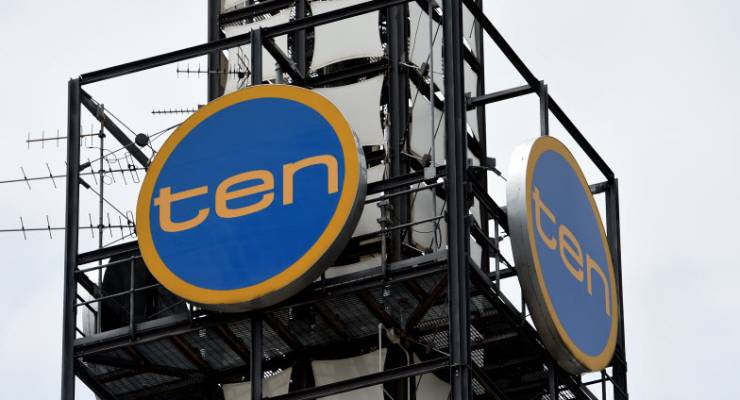
Serious questions now exist about the role of Lachlan Murdoch, 21st Century Fox and Bruce Gordon in placing the Ten Network in administration — sufficiently serious that consideration of media ownership reforms by Parliament cannot credibly proceed at this point.
Communications Minister Mitch Fifield is deep in negotiations today with the crossbenchers on the fate of the government’s Broadcasting Legislation Amendment (Media Reform) Bill 2016, which removes the 75% reach rule — preventing television licensees from reaching more than 75% of the population — and the “two out of three” rule, which prevents ownership of all three of a newspaper, radio licence and television licence in the same market. The bill’s fate is in the hands of the crossbenchers because Labor and the Greens are opposed to the removal of the two out of three rule. There’s fairly widespread acceptance, and has been for years, that the reach rule should go.
Fifield was quick to seize on the placing of Ten in administration as a reason for the bill to be passed. Both rule changes would significantly open up opportunities for Gordon and Murdoch regarding Ten — Gordon could add Ten to his WIN Network, which primarily serves regional Australia and thus would exceed 75% reach, and Murdoch could add Ten to the News Corp stable, thus reaching three out of three in major markets. Or they could do that together. Gordon also owns 14.9% of Nine Entertainment Co, and he has harboured ambitions to own that network.
That Gordon and Murdoch appear to have acted in concert in relation to their refusal to continue to guarantee Ten’s Commonwealth Bank credit facility, forcing the directors of Ten to decide the only option was to place the company in administration, and the fact that they did so immediately ahead of the parliamentary session in which the fate of the bill was to be decided, raises significant questions about whether an attempt is underway to influence Parliament in its deliberations.
There are also questions about the role of 21st Century Fox — controlled by News Corp — in Ten’s efforts to cut its costs, at the same time as Gordon and Murdoch were co-operating. There are plenty of potential conflicts of interest in this saga, and most involve the role of the Murdoch companies — not just Fox and News Corp, but Endemol Shine (50% owned by 21st Century Fox); Foxtel (50% owned by News Corp; it holds 13.8% of Ten), Fox Sports Australia (100% owned by News Corp), MCN (the advertising arm of Foxtel, 25% owned by Ten and the rest by Foxtel), and potential news provider Sky News (100% owned by News Corp).
Gordon and Murdoch, as well as James Packer, who guaranteed the $200 million CBA revolving credit, are owed at least $31 million in fees (as at April 27). They may all apply to be creditors; it is not known what sort of ranking as creditors they have — if they are classed as secured, they might stand behind the CBA. If they are unsecured, they will get very little at all, along with other shareholders. But it will be up to administrators KordaMentha to decide Ten’s fate; they will decide if it is handed back to directors, liquidated or sold to new owners. In administrations, companies rarely return to the original directors.
There are no prima facie breaches of the law in all this, but the matter is not cut and dried. Gordon controls just below the statutory control threshold of 15% of the shares of Ten. Murdoch controls 7.5%. Together, they control just under 22.5%, in addition to Foxtel’s holding. Gordon and Murdoch’s co-operation may amount to control of Ten under existing legislation, or may not — that’s a matter for the Australian Communications and Media Authority. That the control rules might be changed at some point is irrelevant.
As to the actions of the Ten board, Gordon and Murdoch, those are questions for the Australian Securities and Investments Commission.
Both regulators can be directed by the government to carry out investigations — ACMA by the Communications Minister, ASIC by the Treasurer. The questions that now hang over the placing of Ten into administration can be resolved, if the government wants them to be.
In the interim, any decision by parliamentarians about the media reform bill may be undertaken with at best an incomplete understanding of the facts; possibly, they may have been actively misled. And if the bill is passed, that passage will always be clouded by questions of whether the entire political process was gamed.








“The entire political process was gamed” alright. Never trust a Murdoch as far as you can throw them – which would be approximately a centimetre (if I got lucky). When are the Libs and Labs going to wake up to the facts? You can do better Mitch Fifield. Stand up and be counted.
(Bernard, Glenn) ya reckon?
Gamed? Perish the thought, that would require one of the parties to be acting in ignorance rather than both/all being complicit in a strike at the body politic.
Perish the thought.